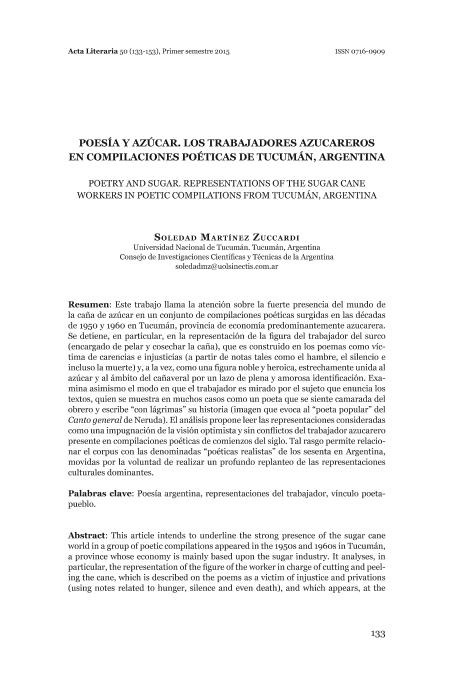Artículo
Este trabajo llama la atención sobre la fuerte presencia del mundo de la caña de azúcar en un conjunto de compilaciones poéticas surgidas en las décadas de 1950 y 1960 en Tucumán, provincia de economía predominantemente azucarera. Se detiene, en particular, en la representación de la figura del trabajador del surco (encargado de pelar y cosechar la caña), que es construido en los poemas como víctima de carencias e injusticias (a partir de notas tales como el hambre, el silencio e incluso la muerte) y, a la vez, como una figura noble y heroica, estrechamente unida al azúcar y al ámbito del cañaveral por un lazo de plena y amorosa identificación. Examina asimismo el modo en que el trabajador es mirado por el sujeto que enuncia los textos, quien se muestra en muchos casos como un poeta que se siente camarada del obrero y escribe "con lágrimas" su historia (imagen que evoca al poeta popular del Canto general de Neruda). El análisis propone leer las representaciones consideradas como una impugnación de la visión optimista y sin conflictos del trabajador azucarero presente en compilaciones poéticas de comienzos del siglo. Tal rasgo permite relacionar el corpus con las denominadas poéticas realistas de los sesenta en Argentina, movidas por la voluntad de realizar un profundo replanteo de las representaciones culturales dominantes. This article intends to underline the strong presence of the sugar cane world in a group of poetic compilations appeared in the 1950s and 1960s in Tucumán, a province whose economy is mainly based upon the sugar industry. It analyses, in particular, the representation of the figure of the worker in charge of cutting and peeling the cane, which is described on the poems as a victim of injustice and privations (using notes related to hunger, silence and even death), and which appears, at the same time, as a noble and heroic figure, connected to sugar and to cane plantations by a bond of full and loving identification. The article also examines the subject that enunciates the poems, who shows himself, in several occasions, as a poet who suffers while he writes the story of the worker and aspires to be his comrade (an image that evokes the "popular poet" from Neruda's Canto general). The representations analyzed here are read as an impugnation of the optimistic and harmonic vision of sugar workers present in poetic compilations from the beginning of the century. That characteristic allows us to relate the corpus studied in this article with the so called "realistic poetics" of the 1960s in Argentina and their will to perform a profound revision of the dominant cultural representations.
Poesía y azúcar: Los trabajadores azucareros en compilaciones poéticas de Tucumán, Argentina
Título:
Poetry and sugar: Representations of the sugar cane workers in poetic compilations from Tucumán, Argentina
Fecha de publicación:
07/2015
Editorial:
Universidad de Concepción. Facultad de Humanidades y Arte. Departamento de Español
Revista:
Acta Literaria
ISSN:
0716-0909
e-ISSN:
0717-6848
Idioma:
Español
Tipo de recurso:
Artículo publicado
Clasificación temática:
Resumen
Palabras clave:
Representaciones
,
Antologías Poéticas
,
Provincia
,
Poesía de Tucumán
Archivos asociados
Licencia
Identificadores
Colecciones
Articulos(INVELEC)
Articulos de INSTITUTO DE INVESTIGACIONES SOBRE EL LENGUAJE Y LA CULTURA
Articulos de INSTITUTO DE INVESTIGACIONES SOBRE EL LENGUAJE Y LA CULTURA
Citación
Martinez Zuccardi, Maria Soledad; Poesía y azúcar: Los trabajadores azucareros en compilaciones poéticas de Tucumán, Argentina; Universidad de Concepción. Facultad de Humanidades y Arte. Departamento de Español; Acta Literaria; 50; 7-2015; 133-153
Compartir
Altmétricas




